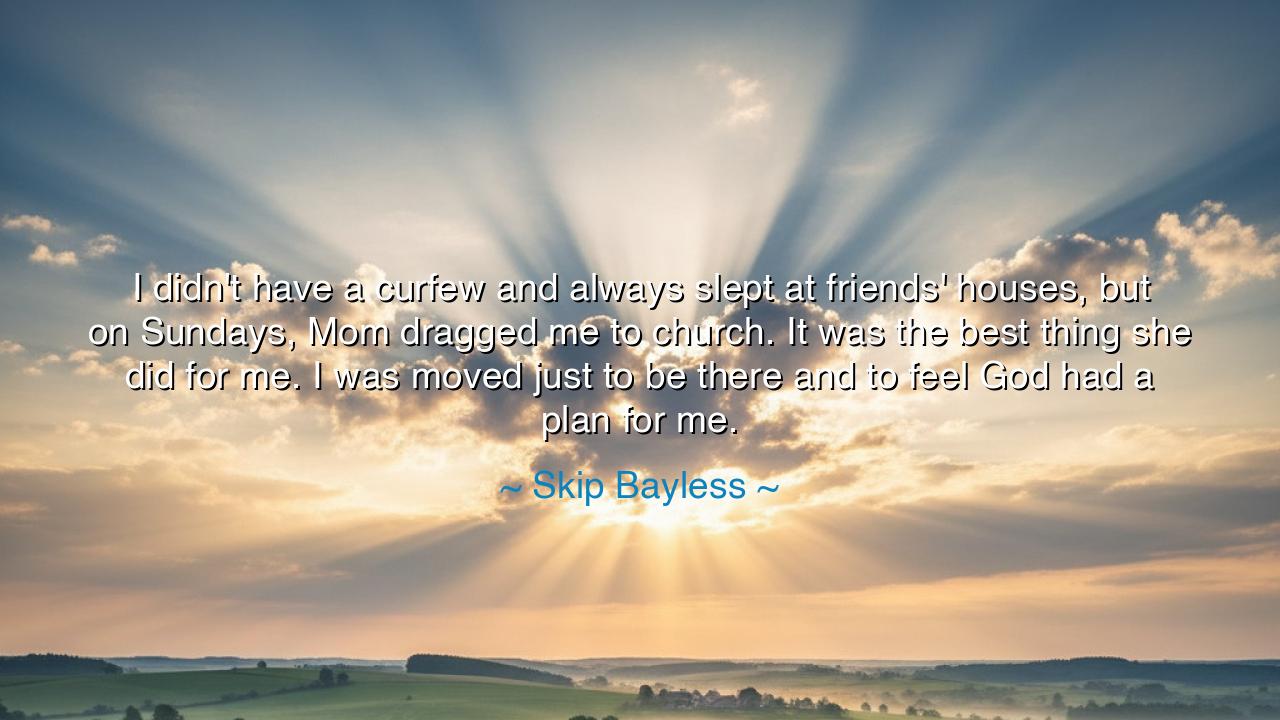
I didn't have a curfew and always slept at friends' houses, but
I didn't have a curfew and always slept at friends' houses, but on Sundays, Mom dragged me to church. It was the best thing she did for me. I was moved just to be there and to feel God had a plan for me.






“I didn’t have a curfew and always slept at friends’ houses, but on Sundays, Mom dragged me to church. It was the best thing she did for me. I was moved just to be there and to feel God had a plan for me.” — Skip Bayless
In these words, Skip Bayless speaks not merely of childhood, but of awakening — the quiet moment when the heart first feels the hand of the divine upon its path. His quote, spoken with humility and reflection, reveals a truth that the ancients long understood: that discipline and faith, even when resisted, become the foundations upon which a life of meaning is built. “It was the best thing she did for me,” he says — not the freedom, not the nights spent with friends, but the insistence of a mother who tethered him, if only once a week, to the eternal. In that act of guidance — that sacred “dragging” to church — she gave him something more enduring than liberty: she gave him purpose.
To the ancients, this would have been a tale of initiation. For every soul, they believed, must one day encounter the sacred and decide whether to heed its call. Skip’s mother, in her wisdom, knew what her son did not yet know — that the world outside offers pleasure and noise, but the temple offers silence and meaning. When she pulled him from the comfort of friendship and forced him toward faith, she played the role of the ancient guardian, the one who sees beyond the horizon of youth. Such mothers are like priestesses of destiny, guiding the young toward the altar not of obligation, but of transformation.
“I was moved just to be there,” he says. In that simple confession lies the moment of recognition — the stirring of the soul that awakens to something greater than itself. The ancients would call this the numinous moment — when one stands before mystery and feels awe rather than fear. For Skip, the church became more than walls and sermons; it became the mirror of his own potential, the whisper that “God had a plan for me.” That realization — that life is not random, that struggle and purpose are entwined — is among the greatest revelations a person can receive. It is the moment the soul stops wandering and begins walking a chosen path.
The story of Saint Augustine mirrors this truth. In his youth, Augustine lived recklessly, chasing pleasure, avoiding restraint, scorning the faith his mother Monica tried to instill. Yet it was her persistence, her tears, and her prayers that drew him back to the divine. Years later, he wrote that her devotion was the instrument of his salvation. So too does Skip Bayless honor his mother’s insistence — though at the time he might have resisted it, in hindsight, he recognizes it as grace disguised as discipline. The mothers of faith are often misunderstood in their time, but the wisdom of their actions ripens with age.
There is also a lesson here about the power of ritual. In a world that exalts freedom without form, it is easy to forget that routine can be sacred. For Bayless, Sunday church was a rhythm that shaped his life — a weekly reminder that beyond the fleeting pleasures of youth lies a deeper order. The ancients knew this well: the farmer who plants with the moon, the warrior who trains with the dawn, the philosopher who contemplates with the stars. These rituals aligned their lives with the greater harmony of the universe. In the same way, that weekly return to church became a spiritual compass, turning him toward meaning even as the world spun in distraction.
And what of his mother’s wisdom? She understood that freedom without faith is emptiness, that the soul must be grounded before it can soar. Though she granted her son liberty — no curfew, no constant supervision — she anchored him in the one place that could hold him steady amid life’s storms. It is a sacred paradox: the hand that sets us free must also be the hand that reminds us of where we belong. The ancients called this balance sophrosyne, the virtue of measured freedom — the harmony between independence and devotion.
Let this, then, be the teaching drawn from Skip Bayless’s remembrance: the seeds of faith, once planted, never die. Even when neglected, they lie waiting beneath the soil of the soul, ready to bloom when life’s winds shift. If you are a parent, remember this story: your guidance, even when resisted, may one day become your child’s greatest gratitude. If you are the child, remember: what seems a burden today may be revealed as a blessing tomorrow.
And to all who wander, who question their purpose, let these words echo: there are moments when we must be “dragged” — by love, by duty, by circumstance — to the place where we are meant to awaken. Do not resist such moments. For in them, as Skip Bayless discovered, the heart may finally hear the eternal voice saying, “You are seen. You are guided. You have a plan.”






AAdministratorAdministrator
Welcome, honored guests. Please leave a comment, we will respond soon